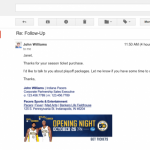Everyone Secretly Hates Your ‘Friendly Reminder’ Email
By Leila Lewis , June 25, 2017
How many times have you gotten this type of message? “Just sending a friendly reminder to please . . .” And how many times have you sent it?
You might think that “friendly reminder” emails are a nice attempt to be professional while disguising your actual annoyance at whoever’s holding you up from finishing something. In other words, it’s just a non-confrontational way to ask for something that’s late.
Well guess what? That’s all a misguided fantasy and it’s making everybody you email with secretly resent you. You need to stop doing it–immediately. Here’s why, and what to write instead.
It Can Undercut Your Credibility
Most of my team is remote, so we conduct most of our communication via videoconferencing. So when I need something from a colleague, I can no longer walk into his or her office and ask for it directly. Instead, I have to rely on email and Skype for Business to get stuff done.
But the risk of defaulting to email is that the friendly reminder is usually contaminated by the word “just”–a hedge word. “Hedge words” are modifiers that soften the blow of your statements, like “kind of,” “maybe,” “actually,” “probably,” and “really,” among others. We frequently insert these words into our writing to convey a softer tone. But they can hurt your credibility in the workplace and even make you sound less confident than you feel.
A couple of years ago, Ellen Petry Leanse, a former executive at Apple and Google, wrote a story for Women 2.0 about how she found herself using words like “just” as a crutch. “It hit me that there was something about the word I didn’t like. It was a ‘permission’ word, in a way–a warm-up to a request, an apology for interrupting, a shy knock on a door before asking, ‘Can I get something I need from you?’”
Same goes for more overt “apology” phrases like, “I’m sorry, but I don’t think that’s a very good strategy.” Why are you sorry for having an opinion? Or for expressing the views you worked hard to develop through education and hard work? Don’t be sorry. By the same token, don’t send “just a friendly reminder.” Send a reminder. Your statements will be clear, direct, and more likely to gain the respect necessary to follow through on the action you’re requesting. (Bonus prize: They’ll also be shorter.)
It Makes It Harder To Communicate With Higher-Ups
What if the person you’re asking is more senior than you? It’s often the case that the higher the rank of the person you’re reminding, the more subordinate your language becomes. What right do you have being bossy to someone who’s doing you a favor, right? Wrong.
Remember, you can be respectful without being a pushover. Good manners never go out of style. You can be polite and assertive at the same time by using proper salutations–your pleases and thank-you’s. So just stick to those. You’re not asking for a favor; you’re trying to get your job done, which benefits the company. True professionals see the big picture.
It’s Easy To Get Lost In Someone’s Inbox
What if your original request wasn’t deliberately ignored? Everyone gets thousands of emails, so yours always the run risk of getting lost in the shuffle. Don’t worsen your odds by sending email with extra hedge words–they’ll instantly sound less important.
Instead of sending a separate reminder email, simply resend the original message with a red “urgent” flag. Or better yet, pick up the–gasp!–phone. (I know, I don’t answer my phone either. But the phone-call attempt sends a strong message.) Try another method like IM, or schedule a 10-minute meeting with the person via calendar invite.
Before working at Polycom, a communications tech company, I never would’ve placed a 10-minute meeting on someone’s calendar in order to quickly request something. But it works! In Microsoft Outlook, if the recipient ignores the meeting request, the appointment still looms on their calendar until it’s declined–trust me, it’s actually a lot less passive aggressive than your friendly reminder.
Leila Lewis is customer marketing manager at Polycom. Throughout her career she has worked in marketing communications leadership roles in enterprise software, technology, education, and health care sectors.
It might seem like the polite thing to do, but it’s actually really annoying.
How many times have you gotten this type of message? “Just sending a friendly reminder to please . . .” And how many times have you sent it?
Fast Company , Read Full Story
(56)













